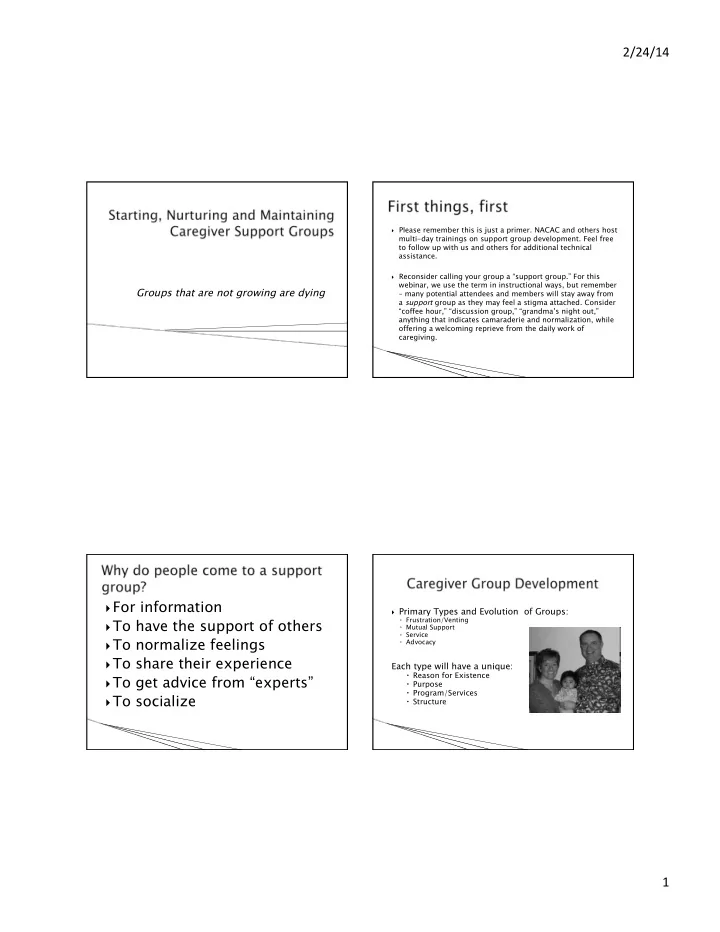

2/24/14 ¡ Please remember this is just a primer. NACAC and others host multi-day trainings on support group development. Feel free to follow up with us and others for additional technical assistance. Reconsider calling your group a “support group.” For this webinar, we use the term in instructional ways, but remember Groups that are not growing are dying – many potential attendees and members will stay away from a support group as they may feel a stigma attached. Consider “coffee hour,” “discussion group,” “grandma’s night out,” anything that indicates camaraderie and normalization, while offering a welcoming reprieve from the daily work of caregiving. For information Primary Types and Evolution of Groups: To have the support of others ◦ Frustration/Venting ◦ Mutual Support ◦ Service To normalize feelings ◦ Advocacy To share their experience Each type will have a unique: Reason for Existence To get advice from “experts” Purpose Program/Services To socialize Structure 1 ¡
2/24/14 ¡ Clarifying Identity As a group leader, one of your first tasks is to ◦ Who are we? find other group members and organize your ◦ What do we care about? first public meeting. ◦ What problem do we want to address? ◦ What are our needs? Decisions and action to take: ◦ Inviti ting new members Building the Foundation ◦ Locati tion ◦ Choosing a Name ◦ Da Day and ti time ◦ Publicity ty ◦ Pla Planning nning ◦ Agend Agenda a Exercise: Identify Your Purpose In caregiver group meetings, facilitation is the art of guiding group discussions and protecting the structure of the ◦ Writing Your Mission Statement meeting to help the group be effective and productive. Dividing the Work Group Member Roles ◦ Task-Oriented ◦ Tracking Progress Human Dynamics ◦ Information and Outreach Facilitator Reminders Discussions ◦ Contacts and Membership ◦ Choosing Topics ◦ Activities and Events ◦ Education and Training ◦ Fundraising Structuring the Meeting: *Beginning *Middle *End 2 ¡
2/24/14 ¡ The benefits of incorporating and obtaining federal tax-exempt status are: donations, foundation Balancing support and education grants, nonprofit mailing privileges, sales tax Childcare and other needs exemptions, and more. Getting Organized Personal crises ◦ Name and Mission Statement Burnout and Compassion Fatigue ◦ Activities and Services Officers ◦ ◦ Board Articles of Incorporation ◦ ◦ By Laws ◦ Tax Exempt Status * This can be a complicated process – contact us for technical assistance. A challenge to most groups is finding and keeping Like a living organism with a life of its own groups a secure funding base: can become sick and die. They can be healed and renewed as they grow and mature into something ◦ The Importance of Obtaining a 501 (C) (3) different. ◦ Keeping Accurate Financial Records ◦ Develop a Budget Be Creative: Value Members Talent ◦ Identifying Funding Sources *Attract New People ◦ Fundraisers / Special Events *Have a Retreat ◦ Dues *Offer Services / Training ◦ In-kind Donations *Respond to Community Needs ◦ Proposals and Grant Writing *Retain Members / Allow Others to Lead / Be Open to Change 3 ¡
2/24/14 ¡ Stage 1 – nervous leader, silent members, people who Keep Communications open eliciting new come once and then not again ideas and participation Stage 2 – members numbers change, members getting a feel if they want to continue coming Have the needs of the group changed? Stage 3 – members coming regularly, more commitment, ready to volunteer, trust, talk and laughter Stage 4 - crisis, the founder leaves, or key people leave Feedback/Evaluation- Do you have any Stage 5 - regroup and rejuvenate: requires planned suggestions to improve our meetings? succession of leadership and/or shared leadership from ◦ Roses and Thorns start Newsletters or E-Newsletters Spread the word about your group. This helps to create awareness about the issue, gather new Council members members, and gain support from the Schools community Other support/caregiver groups Community Organizations Create a unique angle or “hook” to help in Websites promoting your group – name choice and recognition matter Using the web means that our information is available 24/7 Encourage group members to spread the word It will communicate with isolated or disabled members Newspaper articles and announcements 4 ¡
2/24/14 ¡ Don’t confuse effectiveness with It is important to consistently network number of participants. to ensure the group’s ongoing development and maintenance. Maintain your media contacts, stay in touch with your network Allows for the sharing of valuable organizations contacts and information Gain support and referrals Be aware of your own limitations Establishes relationships The more you get your Reassess Your Community Needs (make sure your group is offering services that meet the needs of the members involved, the more community). members will feel useful and Collaborate / Form Service Agreement with Agency have a sense of ownership and (approach service delivery or support ideas that follow the lines of support, prevention and recruitment vested interest in the groups retention). continuance. Look for New Funding Sources (partner with successful community groups and be open to new approaches) Connect with Key People! 5 ¡
2/24/14 ¡ Starting, Nurturing and Maintaining Adoptive Brookdale Foundation Parent Groups: A Guide for Leaders ◦ Publications and Multimedia http://www.brookdalefoundation.org/RAPP/rapp.html ◦ http://www.nacac.org/parentgroups/starting.pdf ◦ Relatives as Parents Guidebook Developing a Parent to Parent Support Network http://www.brookdalefoundation.org/RAPP/ ◦ http://www.nacac.org/adoptalk/ 07-080_n4a_Brookdale_final.pdf parent2parentnetwork.pdf ◦ Developing Rural Relatives as Parents Programming: Taking a Break: Creating Foster, Adoptive and Promising Practices Kinship Respite Care in Your Community http://www.brookdalefoundation.org/RAPP/ ◦ http://adoptuskids.org/_assets/files/NRCRRFAP/ Developing%20Rural%20Relatives%20as%20Parents resources/taking-a-break-respite-guide.pdf %20Programmingpdf.pdf http://www.brookdalefoundation.org/RAPP/ Grandfamilies Outcome Workgroup (GrOW) rapp.html ◦ madelyn@grandparentsasparents.org Kim Stevens, Project Director National Foster Parents Association Advocates for Families First: Enhancing ◦ http://www.nfpaonline.org Support and Advocacy for Children in Foster, Generations United Adoptive and Kinship Families ◦ http://www.gu.org/OURWORK/Grandfamilies.aspx kimstevens@nacac.org North American Council on Adoptable 508-254-2200 Children ◦ http://www.nacac.org/parentgroups/ parentgroups.html 6 ¡
Recommend
More recommend